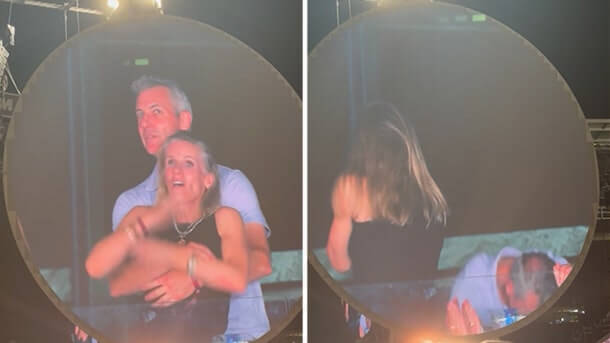World News
From Coldplay Concert to Corporate Collapse: The Fan Behind the Kiss Cam Scandal Speaks Out
The Scandal That Shook the Stage
On a seemingly ordinary summer night in Foxborough, Massachusetts, Coldplay’s “Music of the Spheres” tour took a turn no one expected. The band was in the midst of a magical set at Gillette Stadium when the camera operators initiated a staple of stadium entertainment: the kiss cam. These segments are designed to bring moments of levity, catching unsuspecting couples in affectionate embraces. But this time, the moment would spark a national conversation. The lens landed on two individuals—Andy Byron, CEO of the tech firm Astronomer, and Kristin Cabot, the company’s head of Human Resources. Both appeared awkward, dodging the camera’s gaze. Coldplay frontman Chris Martin added a humorous comment: “Either they’re having an affair, or they’re just very shy.”
That line, paired with the couple’s conspicuously guilty demeanor, sent shockwaves through the audience—and the internet. Within hours, fans had identified the pair, both of whom were married to other people. Clips of the awkward moment surfaced online, complete with commentary, memes, and speculation. Soon after, the hashtag #ColdplayGate began trending. What had begun as a light-hearted concert trope quickly morphed into a career-ending controversy. Byron and Cabot became the epicenter of viral scrutiny, the privacy of their personal lives laid bare to a public hungry for scandal.
The consequences were immediate and severe. Astronomer’s board of directors placed both executives on administrative leave pending a full investigation. Byron, under mounting pressure, resigned from his position within days. Meanwhile, the incident stirred a heated debate about boundaries, ethics, and the public’s right to hold corporate leaders accountable for their private conduct when captured in public spaces.

The Fan Behind the Lens: Grace Springer Breaks Her Silence
In the aftermath of the controversy, public attention shifted to the person who filmed and initially shared the video: Grace Springer. A Coldplay fan and TikTok user, Springer was seated a few rows behind Byron and Cabot during the concert. Her video—just over 10 seconds long—captured the couple’s uncomfortable body language and the exact moment Chris Martin’s commentary seemed to land a truth bomb. After watching the stadium erupt in laughter and awkward glances, Springer uploaded the clip to her TikTok page with a short caption: “So awkward… what’s going on here?”
The post amassed over 30 million views in less than 24 hours. Soon after, Springer’s identity surfaced, and she became a minor celebrity in her own right. In an exclusive interview with TMZ, Springer defended her actions. “A part of me feels bad,” she said, “but actions have consequences. If you’re a CEO, in the public eye, and you’re doing something sketchy, people are going to find out.” She emphasized that she didn’t intend to destroy anyone’s life, but felt justified in exposing what she saw as inappropriate conduct. “Play stupid games, win stupid prizes,” she quipped.
Springer’s defense sparked a flurry of debate online. Was she a whistleblower holding power to account, or just another opportunist chasing viral fame? For many, the answer was somewhere in between. But the cultural climate seemed to be on her side. In a world where corporations emphasize ethics, DEI, and leadership transparency, her decision to share the video resonated with a public already cynical about those in power.
Chris Martin and the Power of Defusing Drama
Three days after the original incident, Coldplay continued their tour with a highly anticipated stop in Madison, Wisconsin. All eyes were on Chris Martin, who had unintentionally become part of the controversy with his well-timed joke. Many wondered whether he would address the scandal or attempt to ignore it. Ever the charismatic frontman, Martin chose humor. Before the kiss cam began rolling, he warned the crowd, “If you haven’t done your makeup, do it now!” The audience erupted in laughter, clearly aware of the subtext. It was a moment of catharsis—shared relief through humor.
Fans also embraced the scandal with satire. At the Madison concert, one attendee held up a homemade sign reading: “He’s Not My CEO,” a phrase that quickly went viral itself. Social media lit up with photos of the sign, and soon, it was being reprinted on T-shirts, mugs, and posters. Coldplay had unwittingly hosted not just a concert but the premiere of a public scandal-turned-pop-culture moment.
Chris Martin’s lighthearted approach helped reframe the story, offering fans a way to laugh rather than linger in outrage. It also highlighted the unique role that artists now play—not just as entertainers, but as cultural moderators. By using humor to bridge the gap between controversy and community, Martin defused the tension while subtly acknowledging that Coldplay’s stage had become a very public theater for corporate drama.

Media, Morality, and the Meme Machine
As the story ballooned, media outlets scrambled to keep up. TMZ released exclusive interviews with Springer. People Magazine ran a cover story on “America’s Most Viral Kiss Cam.” Business Insider examined the corporate implications of the scandal. Even Bravo’s Summer House cast got in on the action, recreating the infamous moment in a TikTok parody. The phrase “kiss cam ethics” began trending alongside hashtags like #CEOScandal and #ChrisMartinKnows.
Experts chimed in from all corners. HR consultants weighed in on power dynamics in the workplace. Ethics professors debated the limits of personal privacy in public spaces. Social psychologists described the scandal as a perfect storm of voyeurism, viral culture, and workplace tension. Media theorists declared it a new benchmark for how real-time entertainment moments could reshape lives overnight.
Perhaps most intriguing was how audiences responded. While some criticized Springer for posting the video, the majority seemed to rally around her. In a society increasingly skeptical of institutional power, the idea that a fan could “out” a powerful CEO using nothing more than a smartphone felt like poetic justice. The incident reinforced how, in the age of smartphones and social media, anyone can become a reporter—and anyone can become the subject of the story.
The Long-Term Fallout and Lessons Learned
As the dust settles, the Coldplay kiss cam scandal leaves behind a trail of personal, professional, and cultural consequences. Andy Byron’s career at Astronomer is effectively over. Kristin Cabot’s professional future remains uncertain as investigations continue. Astronomer itself must now rebuild employee trust, rebrand its image, and establish new boundaries for workplace conduct.
Grace Springer, meanwhile, has become a symbol—either of accountability or of digital vigilantism, depending on whom you ask. For concertgoers, the episode has reshaped how they view stadium entertainment. Kiss cams, once harmless fun, are now potential flashpoints for viral drama. At future events, both fans and performers will be more aware of what’s happening on and off the screen.
Perhaps the biggest lesson is that no one is immune to public scrutiny—not CEOs, not HR heads, and not even the fans behind the camera. The digital age has made it possible for any moment to be broadcast, dissected, and meme-ified in real-time. For leaders, that means a new level of accountability. For audiences, it means greater power—but also greater responsibility.
In the end, Coldplay kept playing. The fans kept laughing. And the world learned once again that in today’s hyper-connected society, a concert can be more than music—it can be a moment of truth.
From newvisiondesignus


